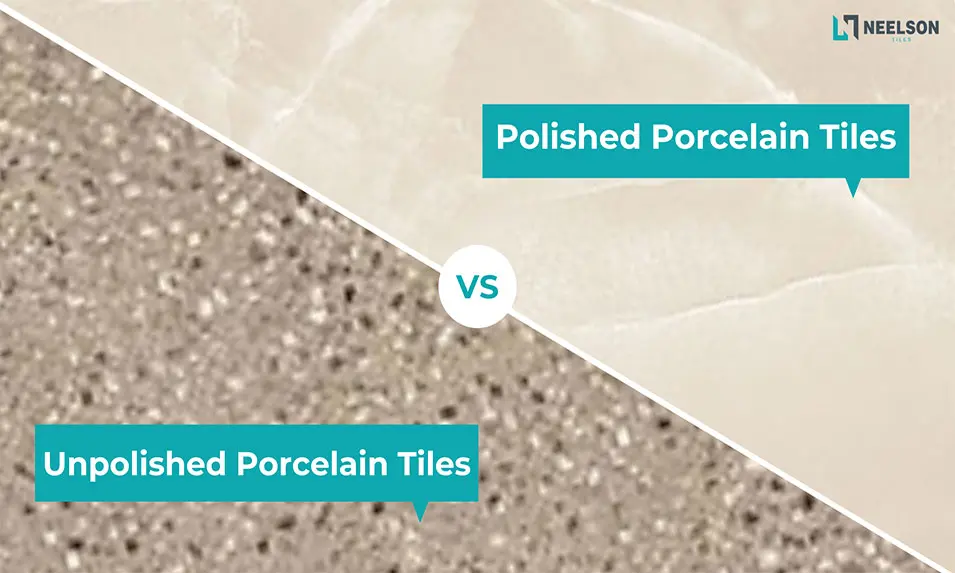
Finding the perfect floor tiles to match your interior, your taste, and your budget is a difficult feat. You may find floor tiles that match your interior and your preferences but are out of your price range, or you may find floor tiles that are within your price range but do not match your preferences. In a nutshell, finding floor tiles that meet all of your requirements is a challenging job. However, there is one exception: polished porcelain tiles.
Polished porcelain tiles look incredibly wonderful and complement almost all types of furniture and décor. Besides, they are also popular with designers and homeowners, and they are a low-cost tile option. However, there is always some dispute about whether to use polished or unpolished porcelain tiles.
In this article, we will look at the differences between these two types and try to get to know them better. So let's get started without further ado.
7 Major Differences between Polished Porcelain Tiles and Unpolished Porcelain Tiles
In the following section, we will look at the seven factors that distinguish polished porcelain floor tiles from unpolished porcelain floor tiles. We'll examine its manufacturing process, finishes, applications, cost, surfaces, sealing, and maintenance. Let's get started.
Polished Porcelain Tiles vs. Unpolished Porcelain Tiles: Manufacturing Process
Polished floor tiles are produced by polishing the tile's surface with a diamond disc to create a sparkling texture. In the case of unpolished floor tiles, however, no such polishing takes place. Moreover, when polished porcelain tiles are manufactured, microscopic pores on the surface are formed, which are camouflaged by the glossy finish. In a nutshell, the production process for both tiles is nearly identical, with the exception of the final phase
Polished Porcelain Tiles vs. Unpolished Porcelain Tiles: Finishes
Polished porcelain tiles, as one might expect, have a gleaming finish and a smooth texture. Moreover, polished tiles are often available in two varieties: glazed and unglazed. On the other hand, Unpolished tiles typically have rustic surfaces and do not exist in glazed and unglazed types like polished tiles. Additionally, polished porcelain floor tiles commonly have a 3D surface, whereas unpolished porcelain tiles have a honed or matte surface.
Polished Porcelain Tiles vs. Unpolished Porcelain Tiles: Applications
Polished porcelain tiles, which have a shiny and slippery surface, are often used indoors. Since polished surfaces are not suitable for high traffic places or commercial use, polished tiles are frequently used only in interior settings. On the other hand, Unpolished tiles have a rustic surface, making them an excellent choice for outdoor and high-traffic areas. Furthermore, because unpolished tiles are less slippery than polished tiles, they can be used in bathrooms and other wet spaces.
Polished Porcelain Tiles vs. Unpolished Porcelain Tiles: Sealing
A sealer is a liquid coating that is applied to the porous surface of tile or grout. It guards against oxidation, natural deterioration, and everyday wear. Sealing is required for polished porcelain tiles. Since polished tiles have microscopic holes on the surface, they must be protected from adhesive or grout. Apply the sealant both before and after the installation. Unpolished porcelain floor tiles, on the other hand, are more resistant to water, grouting, and other spills than polished porcelain floor tiles and do not require sealing.
Polished Porcelain Tiles vs. Unpolished Porcelain Tiles: Surface
Because of the polishing, the surface of polished porcelain tiles is extremely slippery. The downside of this polished surface is that it is prone to scratches. As a result, it is often avoided in bathrooms, wet places, and other public spaces. Unpolished porcelain tiles feature a non-slippery surface and are scratch-resistant, making them an excellent choice for outdoor and commercial applications.
Polished Porcelain Tiles vs. Unpolished Porcelain Tiles: Maintenance
Polished porcelain tiles require more care and attention than unpolished floor tiles due to their shining surface and susceptibility to scratches. You must avoid using anything on the polished tiles that could cause scratches or damage to the surface. In addition, you must clean the tiles every week or 15 days to preserve their sparkling appearance. Unpolished tiles, on the other hand, do not require any such treatment or care. To keep its appeal, clean it once a month.
Polished Porcelain Tiles vs. Unpolished Porcelain Tiles: Price
Since polished porcelain tiles go through one or two additional manufacturing stages and have a better appearance, they are slightly more expensive than unpolished tiles. Moreover, the prices of each of these types varied depending on the manufacturer and the size. Additionally, the price also varies according to the quality. For example, first-hand goods with no damage may be more expensive than second-hand products with minor damage. However, be sure that you can easily find the best polished porcelain tiles as well as unpolished tiles within your price range.
So those are the seven significant differences between polished porcelain tiles and unpolished porcelain tiles. To ensure you make the best choice, go through each of these factors while shortlisting floor tiles and select the one that best meets your needs.
Summary: Neelson Tile is a well-known porcelain tile manufacturer in India. The company boasts an experienced team of tile designers, a world-class manufacturing infrastructure, and cutting-edge technology support. Some of the well-known finishes that the company offers are matt porcelain finish, polished porcelain finish, wood-look porcelain finish, high gloss porcelain finish, and rocker finish. Visit Neelson Tile website to learn more about their products and sizes.
